| |
|
Wednesday, May 28 JFS~Ellen Saks lecture on mental illness
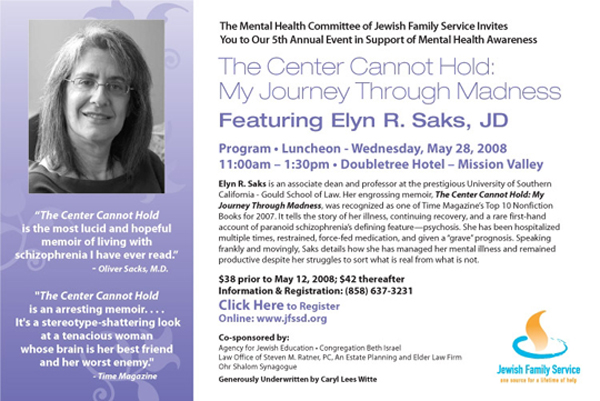

Tuesday, June 3 Guardians Golf & Tennis Tournament


Friday-Saturday, June 6-7 JFS~Judaism on the Wild Side


Sunday, June 8 Temple Solel~Tikkun Leil Shavuot

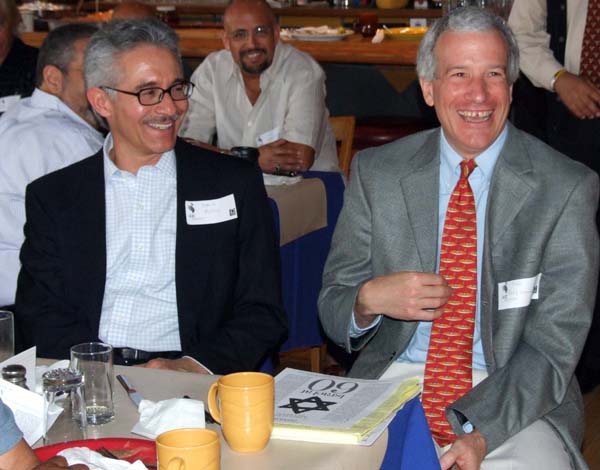
.
THE JEWISH CITIZEN
Protecting America's 'House of Pluralism'
By Donald H. Harrison
 SAN DIEGO—The American 'House of Pluralism' is under attack by political opponents, and Jews and Latinos need to stand together to prevent its collapse, David Ayón, a senior researcher in political science and international affairs, told a crowded breakfast meeting of the Latino-Jewish Coalition in San Diego on Tuesday, May 20. SAN DIEGO—The American 'House of Pluralism' is under attack by political opponents, and Jews and Latinos need to stand together to prevent its collapse, David Ayón, a senior researcher in political science and international affairs, told a crowded breakfast meeting of the Latino-Jewish Coalition in San Diego on Tuesday, May 20.
Ayón of Marymount-Loyola College in Los Angeles and Rabbi Philip Graubart of Congregation Beth El of La Jolla were featured speakers at the meeting at El Comal Restaurant, where nearly 50 attendees heaped their breakfast plates with estofado de pollo (chicken stew), machaca con huevo (shredded meat with eggs) or, for those who preferred not to eat meat, cheliquiles verdes y rojas (tortillas with cream and cheese and red and green sauce) and nopales con huevo (cactus with eggs). For those observing kashrut, there was also a fruit plate of mango, watermelon and honeydew melon.
To the group that meets under the auspices of the American Jewish Committee, Ayón identified "those who are against, for example, the U.S. relationship with Israel, or those who are against anything that might be considered humane immigraton reform" as common political adversaries for the Jewish and Latino communities.
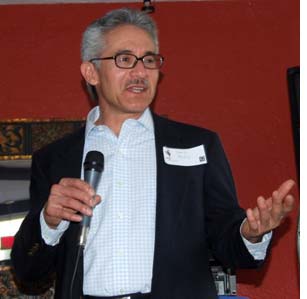 Such critics are in the minority "but they are loud and they often intimidate people who are undecided on issues such as these, " added Ayón (pictured at left). "One of the ways they try to advance a different agenda or a different policy with regard to U.S. policy in the Middle East or U.S. immigration policy is by trying to isolate us and trying to identify that priority and concern as being an ethnocentric, narrow, special interest. And when they do that they are well on the way to deletimizing those things that we think are really important..." Such critics are in the minority "but they are loud and they often intimidate people who are undecided on issues such as these, " added Ayón (pictured at left). "One of the ways they try to advance a different agenda or a different policy with regard to U.S. policy in the Middle East or U.S. immigration policy is by trying to isolate us and trying to identify that priority and concern as being an ethnocentric, narrow, special interest. And when they do that they are well on the way to deletimizing those things that we think are really important..."
Ayón said that the authors of The Israel Lobby, Professors John Mearsheimer and Stephen Walt, are not simply attempting to replace one set of foreign policies with another, but are trying "to isolate it (pro-Israel lobbying) as special interest pleading that is contrary to the national interest. ... If you were to allow that to go unanswered, that is an attack on American pluralism itself. If that was to be successful, if the critics of the U.S. relationship were to succeed in discrediting that relationship as being the province of just a small special interest, we know what comes next--an attack on the other structures of the House of Pluralism."
He likened political attacks on Jews supporting pro-Israel policies to attacks on Latinos seeking to reform the immigration system. "I will give you just one example: People know the Member of Congress Tom Tancredo from Colorado who founded the House Immigration Reform Caucus, which is an anti-immigration reform caucus. He tried to run for president (in the Republican primaries) on that single issue. I know that when he got started, he got a call from the staff of the Congressional Hispanic Caucus asking for a meeting or a dialogue, and his answer was 'I don't think there should be a Congressonal Hispanic Caucus; It shouldn't exist.' Literally that was his answer, so you can see behind a certain policy concern is an opposition to pluralism itself."
The researcher said that what "we need to do is to find and sustain the courage to stand with our friends when they are under attack." Latinos need to forthrightly support Israel and Jews need to voice asn equal measure of solidarity with the Latino drive for imimgration reform. "I think in that way we both maintain the friendship that is between our communities and that is how we preserve a welcoming society for both of us,"Ayón said.
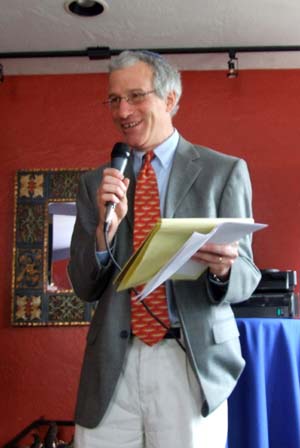 Rabbi Graubart (pictured at right) did not address Latino issues directly, instead focusing his comments on the narrative histories that ethnic groups tend to develop, and how those, in turn, shape group identity. Rabbi Graubart (pictured at right) did not address Latino issues directly, instead focusing his comments on the narrative histories that ethnic groups tend to develop, and how those, in turn, shape group identity.
"I will try to describe what I would call a typical identity that seeped into the heart of most Jews," the Conservative rabbi said. "The story would start that we were wanderers, refugees, in different countries; a minority. In Europe, it was largely Christian...; in the East, it was largely Muslim. We were in communities, but wandering around, never really secure. In some places we would do well.
"I
am not really describing history, although there is some truth to what I am saying. I am talking about a story, a story that gets into your kishkes (insides), one that gets into your soul.
"The difficulty of wandering, of going from place to place, establishing ourselves in communities, being without roots, is that you end up experiencing a sense of vulnerability. Spain is a great example of that. We did very well, but for whatever historic reasons, the majority turns on us, and suddenly we are wandering again. In 1492 the Jews are expelled from Spain, but it is only one of several expulsions... and it developed into a narrative that defines who we are..."
Gruabart told of his grandfather as a young man living in the Ukraine and being stoned by Christians as he walked to school. Later, he hid under a bed during a pogram, only to see outside his window a Cossack killing his mother (Graubart's great-grandmother). Later the grandfather's home was taken away, and he had no way to defend himself but to try to bargain. "They really didn't develop the institutions--the structures--to fight back," said Graubart.
The rabbi said the narrative of the victim continued--and might have ended--with the the Holocaust, were it not for the creation of the State of Israel. "My theory, only a feeling, is that no people can ultimately survive without a sense of dignity," Graubart said. "If it weren't for the State of Israel, after Auschwitz, the Jewish world would have faded away entirely, although we still had numbers. ButI don't think we would have dignity at that point; it hit at the core of our dignity and I think we would have perished."
First by winning its independence in 1948, and then by winning the Six-Day War against the combined might of the Arab armies, Israel's armed forces restored Jewish dignity, said the rabbi. They also touched off a debate, he said, about the nature of Jewish identity. He explained that "when I was growing up ... probably the iconic Jew in the 40s and 50s in America was Albert Einstein, who was a great scientist, very smart, a great humanist (and a refugee) but not what we would call a warrior or a fighter.
"That changed in 1948, and really changed again in 1967 when the iconic Jew became this guy with the eye patch, Moshe Dayan, or Yitzhak Rabin, who fought for Jerusalem." He said a photographic image of Dayan and Rabin walking proudly into Jerusalem "really caught on."
"In the 1940s and 1950s, something like 25 percent of all Jewish boys were named Al or Albert, because they were named after Albert Einstein," Graubart said. "Later many boys were named Moshe or Yitzhak. The question going through American Judaism is 'who are we more: Einstein or Dayan, or soemthing in between?"
Besides by Coalition members, the breakfast meeting was attended by San Diego City Council President Scott Peters, who is running in the June 3 election for the office of San Diego City Attorney.
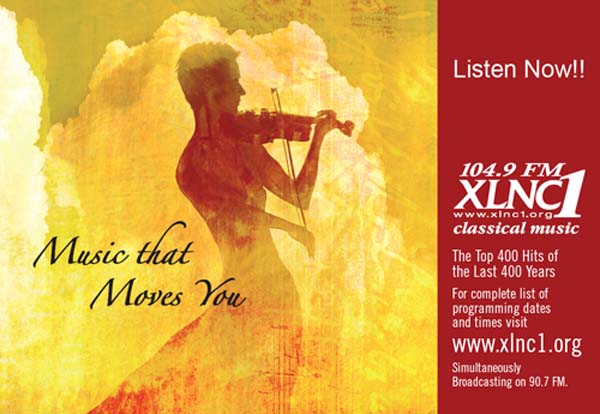

THE JEWS DOWN UNDER A roundup of Australian Jewish news
Conducting the future of music
By Garry Fabian
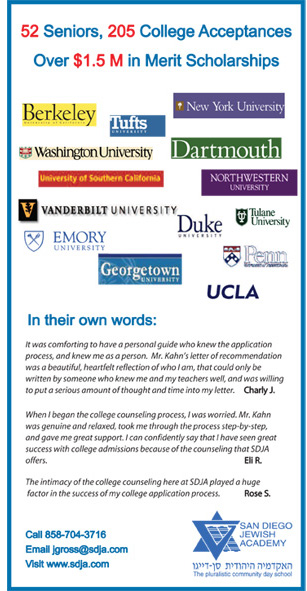 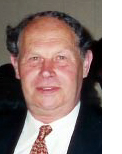 SYDNEY - In 1988, Matthew Krel, a Jewish conductor from Russia, founded the Sydney Broadcasting Studios (SBS) Youth Orchestra, with the aim of giving young musicians valuable experience in performing on television and radio. SYDNEY - In 1988, Matthew Krel, a Jewish conductor from Russia, founded the Sydney Broadcasting Studios (SBS) Youth Orchestra, with the aim of giving young musicians valuable experience in performing on television and radio.
On May 18, two decades since the first group of musicians came together, the orchestra celebrated 20 years of contributions to classical music at the Conservatorium of Music. The orchestra played Wild Swans by Jewish composer Elena Kats-Chernin, and Peter and the Wolf by Prokofiev.
A graduate of the Moscow Academy of Music, Krel was profoundly influenced by Dmitri Kabalevsky and Zoltan Kordaly, two composers of children’s music from Russia and Hungary respectively. He credits them with his desire to work with children.
“I had a very close association with Dmitri Kabalevsky. He and Zoltan Kordaly created the foundation for children’s musical culture. Not only that, but they knew what children wanted. That is why I founded the orchestra,” Krel explained.
“[The orchestra] gives the opportunity for really gifted children to make up their minds to follow music as a profession.”
Apart from Krel, there are several other Jewish musicians in the orchestra, including Elena Kats-Chernin, Netta Dor, and Jolyn Hersch. Krel hopes that, having founded the youth orchestra in association with the SBS, it has given people all over Australia the chance to hear and learn about classical music.
 In 1989, the SBS Youth Orchestra performed publicly for the first time, in Sydney Town Hall. Since then, they have performed in more than 35 countries and have filmed more than 70 documentaries on music, some of which have screened in Australia. In 1989, the SBS Youth Orchestra performed publicly for the first time, in Sydney Town Hall. Since then, they have performed in more than 35 countries and have filmed more than 70 documentaries on music, some of which have screened in Australia.
“We are giving an opportunity for people to enjoy music. Maybe five people will become professionals from what we do, but the rest will enjoy music for the rest of their lives,” said Krel.
“We are building citizens of society. Music affects your soul, your spirit and your mind.”
Australia and Israel, the book
TEL AVIV, Israel—Around 80 notable Australians and Israelis gathered at the Tel Aviv residence of Australian ambassador James Larsen a few days ago for the launch of a book demonstrating the close bonds between the two countries.
Australia and Israel: A Pictorial History was conceived by the Australian embassy’s public affairs official Alison Drury to mark Israel’s 60th anniversary. It is a journey in words and pictures from the 1917 capture of Be’er Sheva by the Australian Light Horse to high-level technology exchanges in the 21st century.
Funded by the Department of Foreign Affairs and Trade (DFAT), the 53-page publication covers the gamut of the shared Australian-Israeli experience, from Jewish National Fund forests to the export of Tim Tams, which end up on Israeli supermarket shelves.
The book was a hit at the dedication of the Park of the Australian Soldier at Be’er Sheva last week, where Larsen presented copies to senior figures, including President Shimon Peres and Australian Governor-General Major General Michael Jeffery.
Larsen said the book captured “the strength of the people-to-people link ... and the way the people-to-people link has provided the base to build up the commercial relationship”.
“The pictures in the book encapsulate what is a warm and strongly supported relationship. At the end of the day, those strong personal links translate very strongly and effectively into an excellent political relationship as well.”
A photographic exhibition linked to the book will travel to key locations in Israel throughout the 60th anniversary celebrations, Larsen said.
The envoy said the Australian embassy would be working closely with the Australia-Israel Cultural Exchange to locate the exhibition in areas where large numbers of the Israeli public will see it.
“There will be opportunities at schools and at other locations as the year progresses,” he said.
Larsen paid tribute to the book’s author Dr Leanne Piggott, who is deputy director of the Centre for International Security Studies at the University of Sydney.
“Leanne’s personal contribution and involvement goes way beyond what she was contracted to do. Her personal engagement and commitment to the project has made it a really high-quality product.”
He said last month’s dedication of the Park of the Australian Soldier at Be’er Sheva attracted “good media coverage in the English-language media, and to a lesser extent, the Hebrew-language media.
“I think the awareness of the Australian experience here has been greatly raised
Budget gets thumbs up from community leaders
CANBERRA - Jewish schools will finally have access to the $25 million fund for security promised late last year by the Federal Government.
In addition, some of those schools will be invited to dip into an additional $16 million funding pool.
The government has followed through on its election promise to correct anomalies in the funding available to Jewish schools.
Over the next four years, funding for schools, such as Yeshivah-Beth Rivkah Colleges and Adass Israel School in Melbourne, and Kesser Torah College and Yeshiva College Bondi in Sydney, will be topped up from a $16 million fund.
Progress is already underway for the allocation of the $25 million security fund.
Minister for Home Affairs Bob Debus has previously requested reports from state governments on the security needs of different schools.
In turn, state government ministers have held meetings with Jewish community representatives in an attempt to ascertain how much money would be required to adequately protect Jewish children.
Executive Council of Australian Jewry president Robert Goot said the Federal Budget held no surprises for the Jewish community.
“The big ticket item was security funding and that is in there,” Goot said.
Among other measures, $6.6 million has been allocated to a national action plan for social cohesion, harmony and security.
This money will fund projects that promote integration, including continued support for ongoing dialogue with the Muslim community.
Jewish Community Council of Victoria president Anton Block and NSW Jewish Board of Deputies president David Knoll both welcomed the funding.
“We’re supportive of anything that can be done to build relationships between ethnic communities,” Block said.
The Jewish community’s disabled and elderly citizens are also likely to benefit from Tuesday night’s budget.
“Jewish Care welcomes the National Disability Strategy and the government’s recognition of the vital role carers play in caring for their loved ones, as evidenced by the additional assistance for carers,” said Bruce Salvin, CEO of Jewish Care Victoria.
Treasurer Wayne Swan said in parliament that a $1,000 lump sum payment would be provided for carer-payment recipients and $600 for carer-allowance recipients.
Salvin added that the increase in the conditional adjustment payment (CAP) would help the organisation continue to provide high-level service at its aged-care homes.
The CAP gives medium-term financial assistance to aged-care homes and the increase will see $2 billion invested in aged care over the next four years.
At the other end of the age spectrum, Knoll welcomed the additional commitment to early childhood education.
Swan detailed the party’s election promise of universal child care for all four-year-olds and re-stated the government’s plan to increase the childcare tax rebate from 30 per cent to 50 per cent.
Knoll said the Board of Deputies had prepared a submission on the topic, prior to the Federal Budget, and was pleased to see the new emphasis.
“The Jewish community is very strong on early childhood education,” he said.
Other initiatives in the budget see Australia’s foreign aid objectives focused on the Asia-Pacific region.
Last year’s budget included $15.3 million of aid for the Palestinian territories but, over the next three years, the Labor Government has pledged to provide close to $1 billion for various development projects for Australia’s neighbours.
Based on record, Liberals weather slur
MELBOURNE - Years of solid support for Israel and the Jewish Community from former Liberal governments counted for plenty in Melbourne last week in the wake of the anti-Semitic slur by a party official against a Jewish candidate in last year's Federal election.
While outraged by the contents of the e-mail, Jewish community leaders and business identities were prepared to stand by the Liberal Party on the basis of the party's unstinting support and genuine friendship to the community over the years, as well as the swift manner and firm resolve with which Victorian Liberal leader Ted Baillieu and Victorian party president David Kemp have dealt with the issue.
"I really don't think it will make a difference and it really ought not to make a difference" Australian/Israel and Jewish Affairs Council (AIJAC) chairman Mark Leibler said.
A number of Jewish business donors would not be drawn on whether the events had affected their willingness to put their hands in their pockets for the party.
Deputy Prime Minister special guest at JNF Gala
MELBOURNE - Deputy Prime Minister Julia Gillard will be the guest speaker at the forthcoming Jewish National's Fund Gala dinner in early June. More than 1,200 guests are expected to attend the function marking the 60th anniversary of the State of Israel.
Sara Gold, president of the JNF (Victoria), said the JNF was thrilled that Gillard had accepted the invitation to address the community and noted that there was a long tradition of close relations between successive Australian governments and the Australian Jewish Community.
The JNF dinner will be Gillard's first public speech to the Australian Jewish Community since the Labor Government took office in November 2007.
Former US ambassador to Egypt and Israel, Daniel Kurtzer will also address the dinner. Kurtzer is currently a Middle East adviser to US Senator Barack Obama. All money raised at the event will be used to assist the Negev Now project, aimed at helping to settle 500,000 people in the Negev.
School racism raises concerns
MELBOURNE - A Jewish anti-racism organisation has expressed deep concerns about anti-Muslim bullying at a Melbourne girls’ school.
B’nai B’rith Anti-defamation Commission chairman Mr John Searle said members of the Jewish community were appalled that Muslim students had been targeted in cyber-bullying at Pascoe Vale Girls College.
“Racism is always wrong. Jewish people know only too well how harmful such prejudice can be and we are distressed that our Muslim fellow Australians are suffering from it.”
Mr Searle said there was a great need for anti-racism education to be improved in Australian schools. “Young people need to grow up appreciating the value of diversity and the essential tolerance which is the key to our multi-cultural society. Schools and parents need to be talking about these issues and reacting strongly to any hint of racism.”
Mr Searle said it was important for schools to understand that racism was not “just bullying” any more than hate crimes were “just hooliganism”.
“These behaviours are a sign of cracks in our social fabric that need to be addressed. They point to a failure to understand that people have the right to live without harassment, to practice their religion, dress or eat or celebrate in accordance with their own culture.”
The extreme end of racism was also evident this week in a racist attack on a group of Aborigines in the Riverina town of Griffith. A group of young Aborigines reported they were threatened by a man armed with a tomahawk and wearing full-length Ku Klux Klan garb.
Mr Searle said for every reported case of extreme bullying and criminal acts there were many cases of mild harassment, racist innuendo and discrimination that undermine the peace of mind of Australians with minority faiths or cultures.
NSW Premier Morris Iemma voices Israel support
SYDNEY - In a recent address to more than 700 people at a function celebrating Israel’s 60th anniversary Premier Iemma stated "The bonds between Australia and Israel run deep and the Jewish community is an integral part of the Australian social fabric.”
"The undeniable truth is that decades of attacks on Israel and the loss of countless lives have achieved nothing. Israel endures … and longs for nothing more than peace."
Iemma said that while we celebrate the bonds between Australia and Israel, and “rejoice in Israel’s unique story of success and survival, we affirm the right of Israel to exist safely within secure borders … just as we affirm the legitimate aspirations of the Palestinian people to a state of their own”.
"However implacable and unrelenting the threats to Israel’s independence, I believe there is cause for hope. Israel remains committed to living side-by-side in peace with a Palestinian state, just as there are Palestinian leaders committed to living in peace with the Jewish state despite the refusal of Hamas to accept that the Jewish nation has a right to self-determination.”
Australians take pride in the story of Israel’s beginnings, Iemma said.
"Australia became the first member of the United Nations to vote in favour of the state of Israel in 1948 and one of the first countries to recognise the new nation and support its admission as the 59th member of the UN. All these milestones, 60 years on, remain a source of pride.”
David Knoll, president of the NSW Jewish Board of Deputies, introduced Iemma. whose parents came from Italy. He said "You Mr Premier, and I, and very many in this room are children of immigrants to this wonderful country. It is with the constant support of your government, that we are able to contribute to the building of dialogue among the many faiths and cultural communities that make up this wonderful state of New South Wales.”
Knoll noted that the Jewish homeland’s declaration of independence stated that Israel “will foster the development of the country for the benefit of all its inhabitants”.
"We hope that Palestinians the world over will publicly commit to peaceful coexistence with their Jewish neighbours. May that day come soon."
Australians invited to view German archives
Six Australians were among a team of more than 40 genealogists invited to Germany this month to review new access arrangements for a major Nazi archive that stores information on Holocaust victims.
The former Gestapo archive, which houses more than 50 million documents on Jewish victims, has given survivors an opportunity to trace their living relatives and discover the fate of vanished family members.
The International Tracing Centre (ITS) in Germany has made significant changes to searching procedures in the archive at Bad Arolsen, allowing the data to be digitally recorded and accessible using key search words and phrases.
Erich Oetiker, deputy director of the archive, told AP that while the staff of 400 continue to process around 1,000 tracing requests each day, there are now daily visits from historians and individuals.
Portions of the archive will now be accessible through Yad Vashem and the Holocaust Museum in Washington DC.
Australian genealogists are currently in Germany to probe the archive and learn more about the new arrangements. Rieke Nash, president of the Australian Jewish Genealogical Society (AJGS) in NSW, Peter Nash, AJGS NSW program coordinator, Gary Binetter, an AJGS NSW member, Lionel Sharpe, AJGS secretary in Victoria, and Liz James and Debbie Jurblum of AJGS in Victoria, are investigating the archive’s new procedures.
Germany’s consent late last year cleared the way for an 11-nation committee operating under the International Committee of the Red Cross to allow wider access to the Nazi archive.
Rieke Nash said that the speed and accessibility of the database have been vastly improved with cross-referencing at a level of detail previously unavailable.
People with information requests need to apply to the ITS direct or through Yad Vashem or the Washington DC museum and should have a reply within eight weeks, Nash said.
F.
< BACK TO TOP


San Diego County Jewish Trivia Balboa Park
Adapted from San Diego Trivia (1989) and San Diego Trivia 2 (1993)
{Editor’s Note: Retired librarian Evelyn Kooperman, a friend to the Jewish community, enjoys playing the cello and collecting trivia about her native city of San Diego. This column excerpts Jewish communal items from her two books, San Diego Trivia (1989) and San Diego Trivia 2 (1993). Readers should note that the information has not been updated since the books were published. Kooperman still has a limited supply of the two books, which cover the general San Diego community in all its aspects. Either of the two volumes sells for $5 and may be obtained by telephoning the author at (619) 461-6095.}
By Evelyn Kooperman
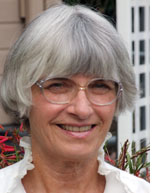 Q1. What is the name of the large statue that is the centerpiece of the Breitbard Hall of Fame in the San Diego Hall of Champions? Q1. What is the name of the large statue that is the centerpiece of the Breitbard Hall of Fame in the San Diego Hall of Champions?
Hints: I. Andrea (formerly Andrea Hoffman), a San Diegan since 1972, was commissioned by Robert Breitbard to create an appropriate sculpture for San Diego's sports museum. She chose as her model Stan Vegar, a student at San Diego StateUniversity who was training for the Olympics and later became a model for Family Fitness Center. At 7 1/2 feet tall, this cast aluminum, hand-polished figure was one of the largest sculptures ever cast in San Diego. Andrea has completed several other sculptures in San Diego, including "Our Lady of Guadalupe at USD, a bust of Mandell Weiss at the La Jolla playhouse, and the Roger Revelle Medal at UCSD.
Q2. What Stephen Sondheim musical had its world premiere at the Old Globe Theatre in December in 1986?
Please click here for answers


ADVENTURES IN SAN DIEGO JEWISH HISTORY
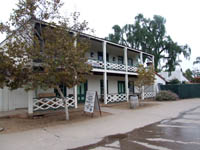
Robinson-Rose House
|
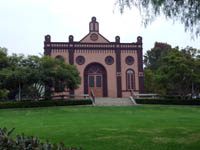
Old Temple Beth Israel |
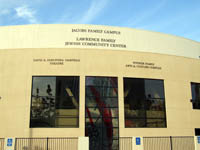
Lawrence Family JCC |
Editor's Note: We are reprinting news articles that appeared in back issues of various San Diego Jewish newspapers. You may access an index of the headlines of those articles by clicking here. You may also use the Google search program on our home page or on the headline index page to search for keywords or names.
Community Currents
From Southwestern Jewish Press, August 4, 1950, page 2
By Albert Hutler, Executive Director, United Jewish Fund
Community Relations Council — Much of the material used by the San Diego Community Relations Council comes from national agencies employing professional workers. You may be interested to know that about 350 Jewish professional workers are engaged specifically in the field of combating anti-Semitism in this country. The Community Relations Council in San Diego is working very closely with the Civic Unity Council of Community Welfare Council and with the California Federation for civic unity. It has gone on record as backing the FEPC for the State of California.
Wohl Leaves for Another Job—San Diego loses an excellent group worker with the resignation of Irwin Wohl, who is taking a new job in Los Angeles. The young people of our community, who saw in Mr. Wohl a first glimmer of hope for a program to fit their needs, are sorry to see him go. They are convinced, as I am, that the Center Program must be continued.
Servicemen's Program Planned — Korean developments will impose new obligations not only on the National Jewish Welfare Board, but on the Jewish Community of San Diego. A new national organization brought to life in 1950 to take the palce of the USO, came to life in San Diego under the name of the "Associated Services to the Armed Forces (ASAF). Organized by the Jewish Welfare Board, the National Catholic Community Service and the National YMCA to finance USO type programs, ASAF will become active in San Diego in the very near future. In collaboration with the Jewish Welfare Board, Victor Schulman, President of the United Jewish Fund, appointed Henry Weinberger as chairman with Rose Neumann and Maxwell Kaufman as the Jewish members of the local committee to help in the formulating of local plans.
Community Chest Calling for Workers — The Community Chest is planning its campaign well in advance of the October opening date. Workers are being called for. It is the duty and the responsibility of every good citizen of the community to participate in the Chest Campaign. A community worth living in ought to be a community worth giving in. Ruth Newman has been selected as the chairman representing the Jewish Welfare Society, a Community Chest Agency, and will soon call on members of the Jewish community to work in the Chest Campaign.
Israel Campaigns — Highest priority task in Israel, according to a report just released, should be to settle immigrants on the land. All other projects in Israel sponsored by American Agencies, should divert part of their funds to the settlement of immigrants on the land, states the report. The program of priorities would be much simpler to handle if we had a central Israeli Philanthropic Fund. This recommendation of the Council of Jewish Federation and Welfare Funds is in the hands of the World's Zionist Congress, which will meet in Jerusalem in December. If Welfare Funds individually were not called upon to make decisions which determine programs in Israel, but rather one single authority in Israel make such allocation on the basis of relative needs, it would be a great and obvious improvement. Top Israeli leaders and UJA leaders want such a fund and budget.
{Return to top}

Nancy Harrison
cruise & tour specialist
(619) 265-0808

San Diego Jewish Trivia Answers: (1) Discus Thrower; (2) Into the Woods

SAN DIEGO JEWISH WORLD THE WEEK IN REVIEW
Shoshana Bryen in Washington, D.C—President Bush in Mideast made us kvell
Donald H. Harrison in San Diego: Marti, Marty: Candidates giving us nachas
J. Zel Lurie in Delray Beach, Florida: What we imagine the Bush and Olmert families 'really' said to each other
Dorothea Shefer-Vanson in Mevasseret Zion, Israel: From would-be English grl to Zionist
Eileen Wingard in San Diego: 'Blue' songs detract from Jewish anthology
Adventures in San Diego Jewish History: What was the Jewish community news in 1950? Who were the newsmakers? Our archives answer these questions in daily installmentsDonald H. Harrison in San Diego: Diplomacy, art and food were mainstays of Israel festival at Lawrence Family JCC
Dov Burt Levy in Salem, Massachusetts: Sabbatical shalom: No, it's not a misspelling
Sheila Orysiek in San Diego: A life story contained in six boxes
Adventures in San Diego Jewish History: What was the Jewish community news in 1950? Who were the newsmakers? Our archives answer these questions in daily installments
Donald H. Harrison in San Diego: Night on Churchill—er, Dizengoff—filled
with new sights and shoulder movements
Natasha Josefowitz in La Jolla, California: What to do with those old family photos
Rabbi Baruch Lederman in San Diego: The Rosh Yeshiva and a Hebrew Christian; story by Yair Hoffman
Rabbi Leonard Rosenthal in San Diego: Starting Jewish studies even as an adult
Ira Sharkansky in Jerusalem: Retaliation in Gaza may be a matter of political timing after Bush, Pelosi visits
Adventures in San Diego Jewish History: What was the Jewish community news in 1950? Who were the newsmakers? Our archives answer these questions in daily installments
Ulla Hadar in Kibbutz Ruhama, Israel: The daily hell on Israel's side of Gaza line
Donald H. Harrison in San Diego: Walk through 4 centuries of S.D. history
Sheila Orysiek in San Diego: Chapter Eight in the serialization of her novel, Reluctant Martyr
Adventures in San Diego Jewish History: What was the Jewish community news in 1950? Who were the newsmakers? Our archives answer these questions in daily installments
Donald H. Harrison in San Diego: SDJA 10th grader breaks CIF seasonal strike out record, besting even David Wells' mark
Rabbi Dow Marmur in Toronto: Gay clergy issue prompts some Canadian congregations to leave United Synagogue
Hal Wingard in San Diego: His songs, "Sara," "Makhtesh Ramon," and "At the Jerusalem Wall"
Adventures in San Diego Jewish History: What was the Jewish community news in 1950? Who were the newsmakers? Our archives answer these questions in daily installments
Link to previous editions
< BACK TO TOP
|
|
